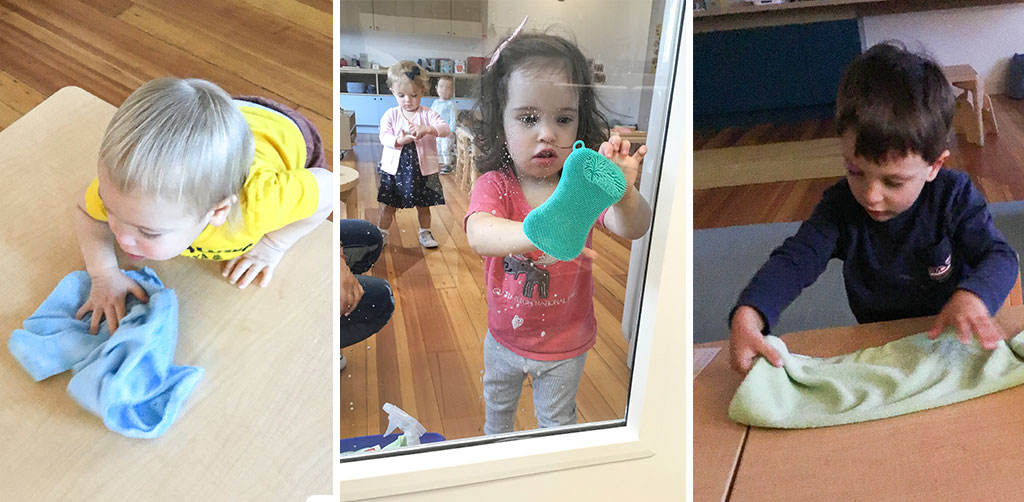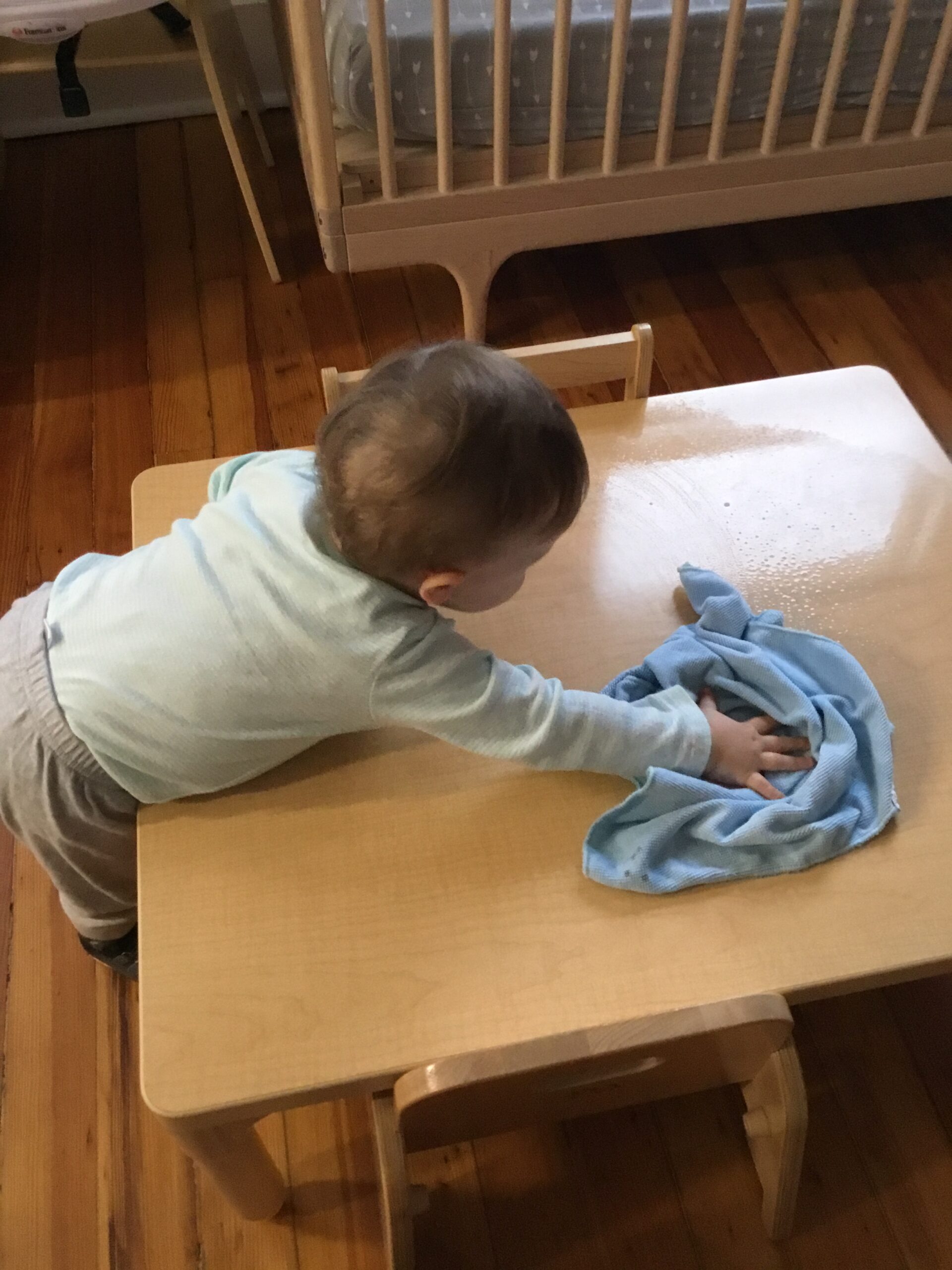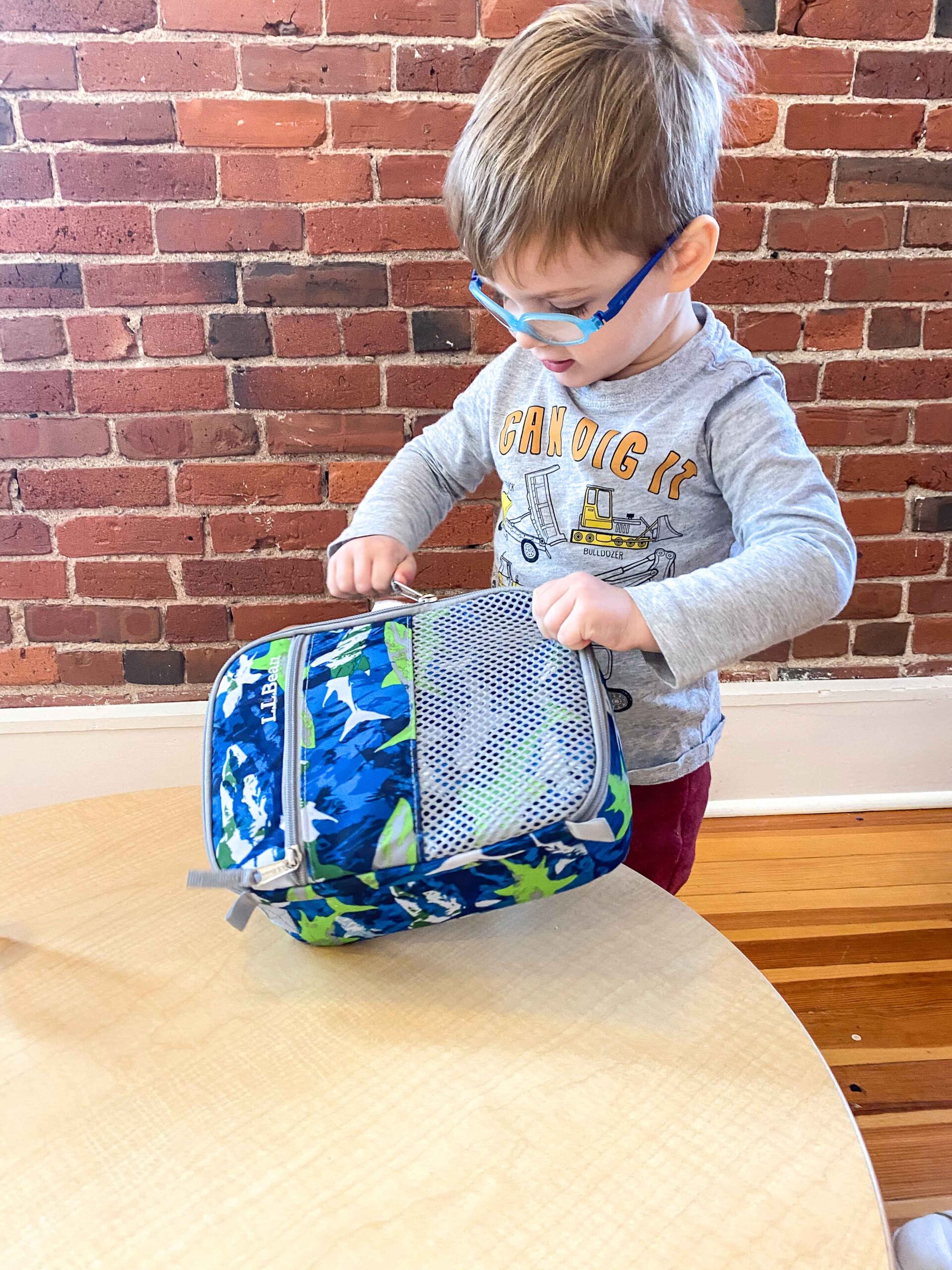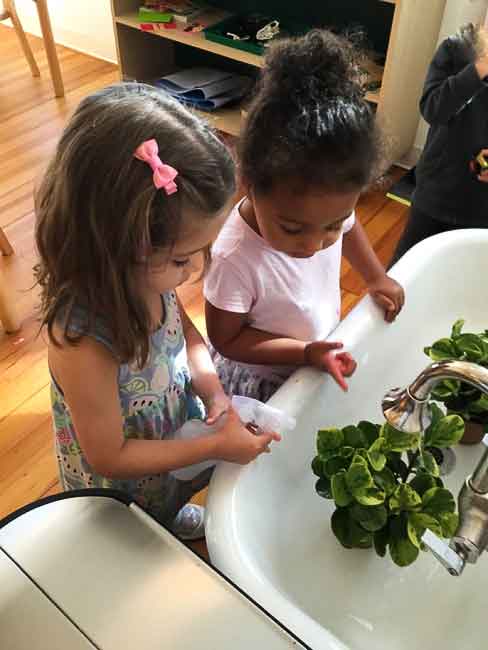As we get closer to the one year mark of living in this pandemic, it’s getting harder to find activities to keep children entertained at home. Luckily for us, young children enjoy participating in cleaning and other chores. The “I do it myself” attitude that many toddlers and preschoolers adopt is helpful in their quest to learn these practical life skills.
Incorporating chores into a weekly routine helps keep household members mentally healthy and resilient, so what a better time for children to practice doing chores than now?

Should I feel guilty for making my toddler do chores?
Not at all!
Toddlers like doing chores and chores are considered practical life skills. By encouraging your child to do chores, you teach your child invaluable lessons that will help them for the rest of their lives. Below we’ve listed a few of the many reasons these practical life skills are great for young ones:
Chores…
- Teach responsibility
- Impart the idea of belonging in a community
- Allow for practice of cooperation and teamwork
- Motivate prosocial behaviors
- Encourage feelings of competence and self confidence
8 tips to get you and your toddler started with chores:
1. Lower your expectations
Accept that by getting help from your toddler, chores may take longer to get completed, but keep in mind all the benefits listed above.
2. Start by asking your child to complete small tasks or sub-tasks
For instance, while you might not consider putting the dish pod in the dishwasher a chore, for a young child this may be a big deal.
3. Think about your child’s interest
Is your child interested in playing with the dog’s water? Have them do a task that involves water, like washing face masks or fruits and vegetables.
4. Think about your child’s abilities
If your child is capable of taking toys or tupperwares out of shelves, then they could also help take the laundry out of the washing machine.
5. Make it fun by gamifying
While loading (or unloading) the washing machine, you can play a guessing game.(“Whose clothing is this?” “Daddy!” Or “Mommy!”) and have your child place that garment inside to be washed. As your child gets older, you could increase the challenge by having them guess or find items by color, garment type (“this is a…t-shirt, these are…pants!”), etc.
6. Do not immediately correct your child’s work
Let them be proud of the work they did and celebrate their efforts!
7. Ask open ended questions
Ex. “What is your favorite part about doing the laundry?” “ this blue shirt is my favorite. What clothes are your favorite?”
8. Encourage your child verbally, not materially
Instead of giving stickers or money for helping around, you may say something along the lines of: “What a great helper! I love it when you help me with the laundry. Our clothes will smell so good!”
Chore chart
What types of chores can my child participate in? Here are some suggestions based on age!

1-2 years
- Wiping spills
- Packing toys aways
- Assisting with starting the dishwasher machine
- Placing dirty clothes in the damper
- Taking clothes in or out of the washer or dryer
- Watering plants

2-3 years
- Putting toys, lunch boxes and groceries away
- Wiping the window clean
- Dressing themselves
- Serving yogurt and cereal into a bowl
- Hand washing their face mask or small items of clothing
- Washing fruits and vegetables
- Helping set and clear the table
- Assisting with cooking simple recipes

3-5 years
- Feeding pets
- Making their beds (it may be just straightening the covers at first)
- Refilling containers (e.g., salt and pepper and liquid soap containers)
- Pouring water using a cup or small pitcher
The above are just recommendations. Based on your child’s experiences and developmental progression, they may be able to do other chores as well!
During this pandemic, we’re forced to slow down and spend more time at home. There is no better time to start thinking about introducing chores to young children!
Introducing chores to young children takes patience, but when you realize how much there is to learn at home while doing chores (in addition to building bonds and memories), you can breathe much easier.
With your patience, supervision, and encouragement, your child will be mastering these practical life skills in no time (and helping you keep a happy and beautiful home 😉)!
Till Next Post,
Aleezeh Makani
Ethos Early Learning Center Educator
Ethos is a new mindset and model for child care and early education for children aged 6 weeks to 5 years in the South Boston, MA Area. We pride ourselves on our dedication to serving our students and families in ways that are research-driven and nurturing to who they are and can become. Request more information online here!
Waugh, W., Brownell, C., & Pollock, B. (2015). Early socialization of prosocial behavior: Patterns in parents’ encouragement of toddlers’ helping in an everyday household task. Infant Behavior and Development, 39, 1-10.
Warneken F, Tomasello M. Parental presence and encouragement do not influence helping in young children. Infancy. 2013;18(3):345–368
Warneken F, Tomasello M. Extrinsic rewards undermine altruistic tendencies in 20-month-olds. Developmental Psychology. 2008;44(6):1785–1788.
Grusec, J. E., Goodnow, J. J., & Cohen, L. (1996). Household work and the development of concern for others. Developmental Psychology, 32(6), 999.
Hammond, D. I. (1979). An explanatory study of a workshop on sex and aging (Unpublished doctoral dissertation). University of Georgia, Athens, GA.
White, E. M., DeBoer, M. D., & Scharf, R. J. (2019). Associations Between Household Chores and Childhood Self-Competency. Journal of developmental and behavioral pediatrics : JDBP, 40(3), 176–182.